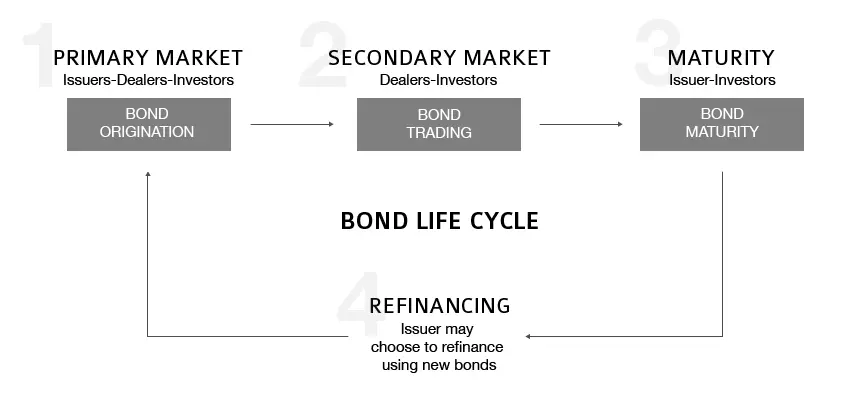OVERVIEW
Life Cycle of a Bond
Bonds are originated in the primary market through a bond issuance process that offers the issue to the public for the first time. During this process, issuers receive capital, and in return, provide investors with bond certificates that outline the issuer’s obligations. Once the bonds are issued and in circulation, they are traded among investors and dealers in the secondary market. At the maturity date, bondholders receive a final coupon payment and are repaid the principal amount. Issuers have the option to refinance the debt obligations through the issuance of new bonds in the primary market.

The Market
The market is commonly used to refer to the primary and secondary markets collectively. In the debt capital markets, the primary market is the market where new bonds are created and the secondary market is the market where existing bonds are traded. The market provides an exchange for capital and is strictly regulated.
Bond Origination – Primary Market
The primary market is where corporations and government entities raise funds from investors. This is done through issuing new fixed income securities to investors in exchange for capital. In other words, fixed income securities are “originated” in the primary bond market. Bond originations are facilitated by dealers who act as an intermediary between issuers and investors.
Bond Trading – Secondary Market
The secondary bond market is where existing bonds are traded among holders of fixed income securities (i.e. investors). Fixed income securities are generally traded over-the-counter through a decentralized dealer network. This contrasts with the equity markets, where securities can be readily traded on centralized exchanges. In particular, sales and trading desks at investment banks (dealers) facilitate transactions between buyers and sellers. Electronic trading platforms, usually in the form of interdealer networks provide an alternative marketplace to trade fixed income securities.
Bond Redemption & Maturity
Fixed income securities have a set maturity date, at which, principal amount is repaid to investors. Alternatively, issuers may redeem bonds prior to maturity through exercising early redemption features such as call provisions. Issuers may refinance bond maturities by issuing new bonds at or near the maturity date.
IN THE PRESS
"Overbond Ltd., the first end-to-end fixed income markets fintech platform for AI predictive analytics, has launched COBI Pricing, a new proprietary bond pricing and liquidity risk management automation solution. COBI (Corporate and Government Bond Intelligence) is a comprehensive..."




